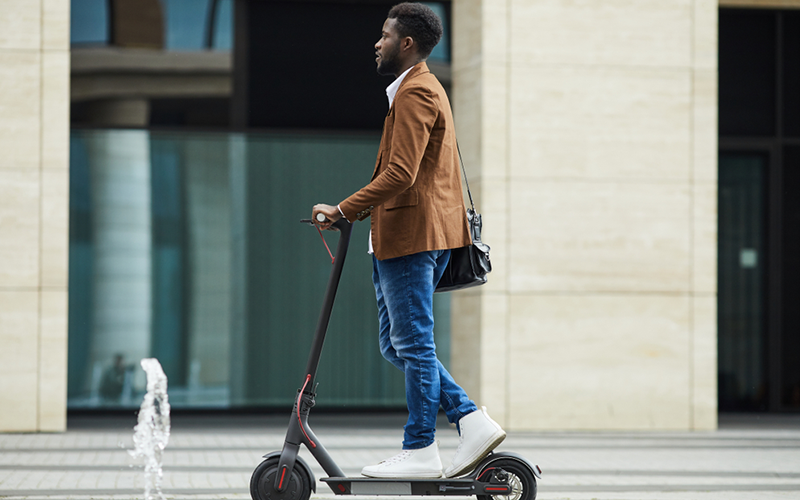The topic of (green) mobility is alive and well among Belgian companies. Our annual mobility barometer shows a reversal: cars are losing ground (-0.6%), while cycling is gaining in popularity (+7.4%). Furthermore, commercial vehicles are also becoming more green: 10% of all commercial vehicles are now hybrid vehicles and 3.2% are fully electric. The number of enquiries Acerta receives about green mobility has also increased dramatically over the past year. What are the most frequently asked questions? We list them and answer them!
The mobility enquiries that Acerta receive appear to focus mainly on green mobility. They are questions concerning...
Employees entitled to a company car can seek an alternative mobility solution through the mobility budget (if their employer offers this). The mobility budget consists of three pillars:
In the second pillar, interest (and, since 1 January 2022, capital repayments) on a mortgage loan can be financed with the mobility budget. The condition is that employees must live within 10 km of their place of work (it used to be within 5 km).
A home office can also be considered a place of work. If an employee works 60% of their working hours from home, then the interest and capital repayments of the mortgage loan(s) related to their residence can also be offset through pillar 2. Whether a home office can be considered a workplace is assessed monthly. Employees must also be able to prove to the administration that their place of residence is their normal place of employment.

Several scenarios are possible regarding the installation of charging stations and the electricity consumption when charging a car.
When an employer provides a charging station and the employee has a company car, the reimbursed electricity and installation costs for the installation of a charging station at an employee's home are - under certain conditions - included in the benefit of that company car. In short, this is treated the same as a fuel card or charge card and is part of a company car benefit.
If an employer provides a charging station and the employee drives his own car (i.e. not a company car), the charging station and the reimbursement of the purchased electricity constitute benefits that are taxable and subject to social security contributions. More specifically, the portion of the benefit related to purely private movements is subject to social contributions. For tax purposes, the portion of the benefit related to purely private travel and commuting is a taxable benefit. The benefit should be estimated as accurately as possible, based on the actual value.
If the employee invests in their own private charging station and the employer provides an intervention for this and/or the employer reimburses the electricity costs for charging the private car, this is in principle a taxable remuneration subject to social security contributions. The same reasoning applies here as for the provision of a charging station without a company car, as explained above.
When the employee's own charging station is used to charge a company car, the reimbursed electricity costs are, under certain conditions, not subject to social contributions. The tax authorities have not yet clarified whether or not these refunds are taxable.

An (electric) scooter is not considered by the NSSO as equal to an (electric) bicycle, speed pedelec or other means of transport. This has a number of implications.
1/ When an employer provides a scooter to their employee and the employee is only allowed to use it for commuting and/or making trips on behalf of the employer, such use does not constitute a benefit to the employee and no contributions are payable on it.
2/ If an employer provides a scooter to their employee, and the employee uses it for both private and work purposes, the benefit should be determined based on private use.
3/ If an employee travels on his own scooter, the employer may reimburse the actual costs incurred by the employee when using it for commuting and work-related travel. It is up to the employer to prove that it has determined the reimbursement of expenses in such a way that only the actual costs incurred are reimbursed.
Employers cannot give an NSSO-free allowance (similar to the bicycle allowance) for commuting by scooter.

If you would like to change the agreements and options regarding your car policy, you must always check whether they are laid down in:
There are usually modification clauses that allow you to make periodic changes, such as limiting private use, a (higher) personal contribution or limiting the use of a fuel card.
Take note that you should never unilaterally modify agreements. There is always the need for an agreement with your employee and/or the union bodies. However, you can immediately roll out a new company car policy for employees who are new to the company.
Getting started with the mobility budget
How has the mobility budget fared five years after it was introduced? What are the most popular choices? We also provide an overview of the advantages for employees.
Read moreMobility solutions for your employees: the bike as a favourite
A lease bike, (electric) company car or mobility budget? There are many ways to flexibly reward your employees when it comes to mobility. And you also get to achieve this in a green and sustainable manner.
Read moreThe mobility budget is to have an official calculation formula
Good news for companies that wish to implement the mobility budget: the government has published an official formula to calculate the amount of the annual mobility budget. This comes with a view to raising transparency in order to hopefully further increase mobility budgets.
Read more

